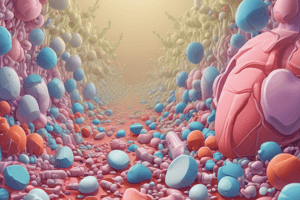Podcast
Questions and Answers
What class of medication is Diltiazem?
What class of medication is Diltiazem?
- Calcium channel blocker (correct)
- ACE inhibitor
- Diuretic
- Beta blocker
What is the mechanism of action of Diltiazem?
What is the mechanism of action of Diltiazem?
Block influx of calcium ions into cardiac muscle.
Which of the following are indications for Diltiazem? (Select all that apply)
Which of the following are indications for Diltiazem? (Select all that apply)
- Weight loss
- Treatment of infections
- Control of rapid ventricular rates (correct)
- Angina pectoris (correct)
Which condition is a contraindication for Diltiazem?
Which condition is a contraindication for Diltiazem?
What are common adverse reactions of Diltiazem?
What are common adverse reactions of Diltiazem?
What precautions should be taken regarding drug interactions with Diltiazem?
What precautions should be taken regarding drug interactions with Diltiazem?
How is Diltiazem supplied?
How is Diltiazem supplied?
What is the initial dose of Diltiazem for adults?
What is the initial dose of Diltiazem for adults?
What is the duration of action for Diltiazem?
What is the duration of action for Diltiazem?
Diltiazem is considered safe during pregnancy.
Diltiazem is considered safe during pregnancy.
Study Notes
Diltiazem (Cardizem) Overview
- Diltiazem is classified as a calcium channel blocker, primarily used to manage cardiovascular conditions.
Mechanism of Action
- Inhibits calcium ion influx into cardiac muscle, leading to reduced myocardial oxygen demand.
- Acts as an arterial and venous vasodilator, decreasing both preload and afterload.
- Helps prevent coronary artery spasms.
Indications for Use
- Effective in controlling rapid ventricular rates from atrial flutter, atrial fibrillation, and paroxysmal supraventricular tachycardia (PSVT).
- Used to treat angina pectoris.
Contraindications
- Should not be administered to patients with hypotension, sick sinus syndrome, or advanced AV block (second or third degree).
- Contraindicated in cases of cardiogenic shock and wide-complex tachycardias.
Adverse Reactions
- Potential side effects include bradycardia and heart block, which can lead to chest pain and congestive heart failure (CHF).
- Other noteworthy reactions can be syncope, ventricular fibrillation, and dizziness, along with gastrointestinal symptoms like nausea and dry mouth.
Drug Interactions
- Use caution with medications that influence cardiac contractility.
- Generally not recommended for patients currently taking beta-blockers due to potential cumulative effects.
How Supplied
- Available in 25 mg/5 ml and 50 mg/10 ml vials for intravenous administration.
- Non-refrigerated options include LYO-JECT syringes.
Dosage and Administration
- For adults, the initial bolus is 0.25 mg/kg (commonly around 20 mg IV over 2 minutes).
- If a response is inadequate, a second bolus of 0.35 mg/kg can be administered after 15 minutes.
- Maintenance infusion ranges from 5 to 15 mg/hour.
- Diltiazem is not recommended for pediatric patients.
Duration of Action
- Onset of action occurs within 2-5 minutes, with peak effects being variable.
- The duration of action ranges from 1 to 3 hours.
Special Considerations
- Classified as a pregnancy safety category C drug.
- Caution is advised when prescribing to patients with renal or hepatic issues.
- Premature ventricular contractions (PVCs) may occur during the conversion from PSVT to sinus rhythm.
Studying That Suits You
Use AI to generate personalized quizzes and flashcards to suit your learning preferences.
Description
This quiz provides an overview of Diltiazem, a calcium channel blocker used in treating various cardiovascular conditions. You'll learn about its mechanism of action, indications, contraindications, and potential adverse reactions. Test your knowledge and understanding of this important medication.




